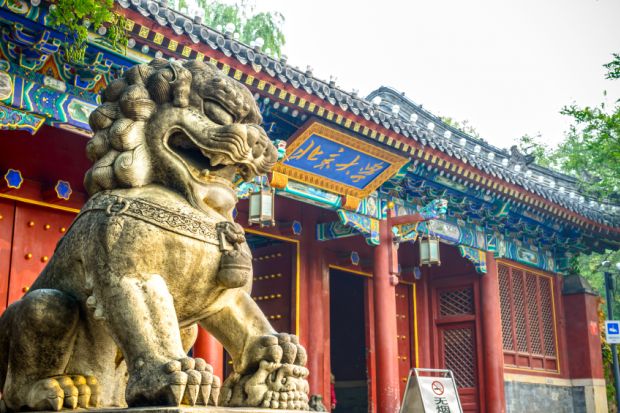Peking University has reportedly informed teachers and students that they must seek advance approval before participating in foreign online conferences.
The move has attracted criticism from human rights advocates, who saw the restrictions as a threat to academic freedom. However, scholars in mainland China said that the rules were not a major shift from current practices.
According to a circular, participants in foreign-hosted webinars need to provide documentation and wait for approval at least 15 days in advance. Hosting organisations in Hong Kong, Macau and Taiwan will be treated in the same way as “foreign” ones.
These rules are similar to existing practices for mainland Chinese academics wishing to travel in-person to overseas events. Peking University did not respond immediately to a request for comment.
A foreign academic at Peking University told Times Higher Education that, aside from reading about these rules in the press, he had not heard of them or been instructed to do anything differently.
Another scholar told THE that the rules furthered instructions from the government. This academic felt that the rules were likely to be “applied flexibly” and may not pertain to foreign staff and students.
Human Rights in China (HRIC), an non-government organisation headed by a professor emerita of law at the City University of New York, said in a statement that “in an era when online conferencing serves teachers and students globally by connecting them, spreading knowledge, and enabling exchange of ideas across borders, the requirement to ‘declare’ and obtain ‘approval’ before participation in online conferences also restricts and chills the legitimate exercise of academic freedom”.
HRIC said the move could “contribute to undermining the kinds of academic and expert exchanges of information, analyses and international collaboration critical to identifying and effectively addressing the complex global, cross-border health and other challenges facing China and the world”.
It outlined two articles in the directive that it found problematic: the requirement that an event’s agenda and discussion topics be shared in advance, and that participants “keep secrets” during the event. It questioned if scholars in sensitive fields would be “willing to risk political censure” by applying to speak at or attend a global event.
“A vague secrecy requirement implemented by Peking University, one of the major institutions in China, will also undermine its international reputation for innovation and research,” HRIC wrote.
The organisation said that “the expansion of this requirement to other universities and institutions will need to be monitored.” However, THE has heard that other Chinese universities already have similar rules.
The shift to online courses and conferences this year, caused by the Covid-19 pandemic, has highlighted gaps in communication caused by the Great Firewall. Foreign universities are grappling with how to “jump the wall” to teach students in mainland China, where even university-supplied virtual private networks (VPNs) may not work.
Register to continue
Why register?
- Registration is free and only takes a moment
- Once registered, you can read 3 articles a month
- Sign up for our newsletter
Subscribe
Or subscribe for unlimited access to:
- Unlimited access to news, views, insights & reviews
- Digital editions
- Digital access to THE’s university and college rankings analysis
Already registered or a current subscriber? Login








